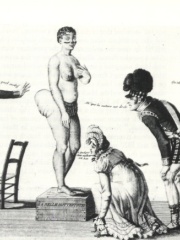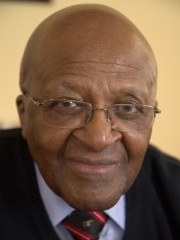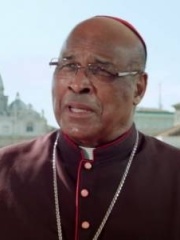


The Most Famous
RELIGIOUS FIGURES from South Africa
This page contains a list of the greatest South African Religious Figures. The pantheon dataset contains 3,187 Religious Figures, 3 of which were born in South Africa. This makes South Africa the birth place of the 72nd most number of Religious Figures behind Libya, and Yemen.
Top 3
The following people are considered by Pantheon to be the most legendary South African Religious Figures of all time. This list of famous South African Religious Figures is sorted by HPI (Historical Popularity Index), a metric that aggregates information on a biography's online popularity.

1. Sarah Baartman (1788 - 1815)
With an HPI of 74.82, Sarah Baartman is the most famous South African Religious Figure. Her biography has been translated into 32 different languages on wikipedia.
Sarah Baartman (Afrikaans: [ˈsɑːra ˈbɑːrtman]; c. 1789 – 29 December 1815), also spelled Sara, sometimes in the Dutch diminutive form Saartje (Afrikaans pronunciation: [ˈsɑːrki]), or Saartjie, and Bartman, Bartmann, was a Khoikhoi woman who was exhibited as a freak show attraction in 19th-century Europe under the name Hottentot Venus, a name that was later attributed to at least one other woman similarly exhibited. The women were exhibited for their steatopygic body type – uncommon in Northwestern Europe – that was perceived as a curiosity at that time, and became subject of scientific interest as well as of erotic projection. "Venus" is sometimes used to designate representations of the female body in arts and cultural anthropology, referring to the Roman goddess of love and fertility. "Hottentot" was a Dutch-colonial era term for the indigenous Khoikhoi people of southwestern Africa, which then became commonly used in English, and was shortened to "hotnot" as an offensive term; the term "Hottentot" refers to the tribe, like Zulu or Xhosa. The Sarah Baartman story has been called the epitome of racist colonial exploitation, and of the commodification and dehumanization of African people.

2. Desmond Tutu (1931 - 2021)
With an HPI of 73.44, Desmond Tutu is the 2nd most famous South African Religious Figure. His biography has been translated into 95 different languages.
Desmond Mpilo Tutu (7 October 1931 – 26 December 2021) was a South African Anglican bishop and theologian, known for his work as an anti-apartheid and human rights activist. He was Bishop of Johannesburg from 1985 to 1986 and then Archbishop of Cape Town from 1986 to 1996, in both cases being the first Black African to hold the position. Theologically, he sought to fuse ideas from Black theology with African theology. Tutu was born of mixed Xhosa and Motswana heritage to a poor family in Klerksdorp, South Africa. Entering adulthood, he trained as a teacher and married Nomalizo Leah Tutu, with whom he had several children. In 1960, he was ordained as an Anglican priest and in 1962 moved to the United Kingdom to study theology at King's College London. In 1966 he returned to southern Africa, teaching at the Federal Theological Seminary and then the University of Botswana, Lesotho and Swaziland. In 1972, he became the Theological Education Fund's director for Africa, a position based in London but necessitating regular tours of the African continent. Back in southern Africa in 1975, he served first as dean of St Mary's Cathedral in Johannesburg and then as Bishop of Lesotho; from 1978 to 1985 he was general-secretary of the South African Council of Churches. He emerged as one of the most prominent opponents of South Africa's apartheid system of racial segregation and white minority rule. Although warning the National Party government that anger at apartheid would lead to racial violence, as an activist he stressed non-violent protest and foreign economic pressure to bring about universal suffrage. In 1985, Tutu became the Bishop of Johannesburg and in 1986 the Archbishop of Cape Town, the most senior position in southern Africa's Anglican hierarchy. In this position, he emphasised a consensus-building model of leadership and oversaw the introduction of female priests. Also in 1986, he became president of the All Africa Conference of Churches, resulting in further tours of the continent. After President F. W. de Klerk released the anti-apartheid activist Nelson Mandela from prison in 1990 and the pair led negotiations to end apartheid and introduce multi-racial democracy, Tutu assisted as a mediator between rival black factions. After the 1994 general election resulted in a coalition government headed by Mandela, the latter selected Tutu to chair the Truth and Reconciliation Commission to investigate past human rights abuses committed by both pro and anti-apartheid groups. Following apartheid's fall, Tutu campaigned for gay rights and spoke out on a wide range of subjects, among them his criticism of South African presidents Thabo Mbeki and Jacob Zuma, his opposition to the Iraq War, and describing Israel's treatment of Palestinians as apartheid. In 2010, he retired from public life, but continued to speak out on numerous topics and events. As Tutu rose to prominence in the 1970s, different socio-economic groups and political classes held a wide range of views about him, from critical to admiring. He was popular among South Africa's black majority and was internationally praised for his work involving anti-apartheid activism, for which he won the Nobel Peace Prize and other international awards. He also compiled several books of his speeches and sermons.

3. Wilfrid Napier (b. 1941)
With an HPI of 56.43, Wilfrid Napier is the 3rd most famous South African Religious Figure. His biography has been translated into 26 different languages.
Wilfrid Fox Napier O.F.M. (born 8 March 1941) is a South African Franciscan friar and prelate of the Catholic Church. He served as Archbishop of Durban from 1992 to 2021 and has been a cardinal since 2001. He served as Bishop of Kokstad from 1981 to 1992.
People
Pantheon has 3 people classified as South African religious figures born between 1788 and 1941. Of these 3, 1 (33.33%) of them are still alive today. The most famous living South African religious figures include Wilfrid Napier. The most famous deceased South African religious figures include Sarah Baartman, and Desmond Tutu.

